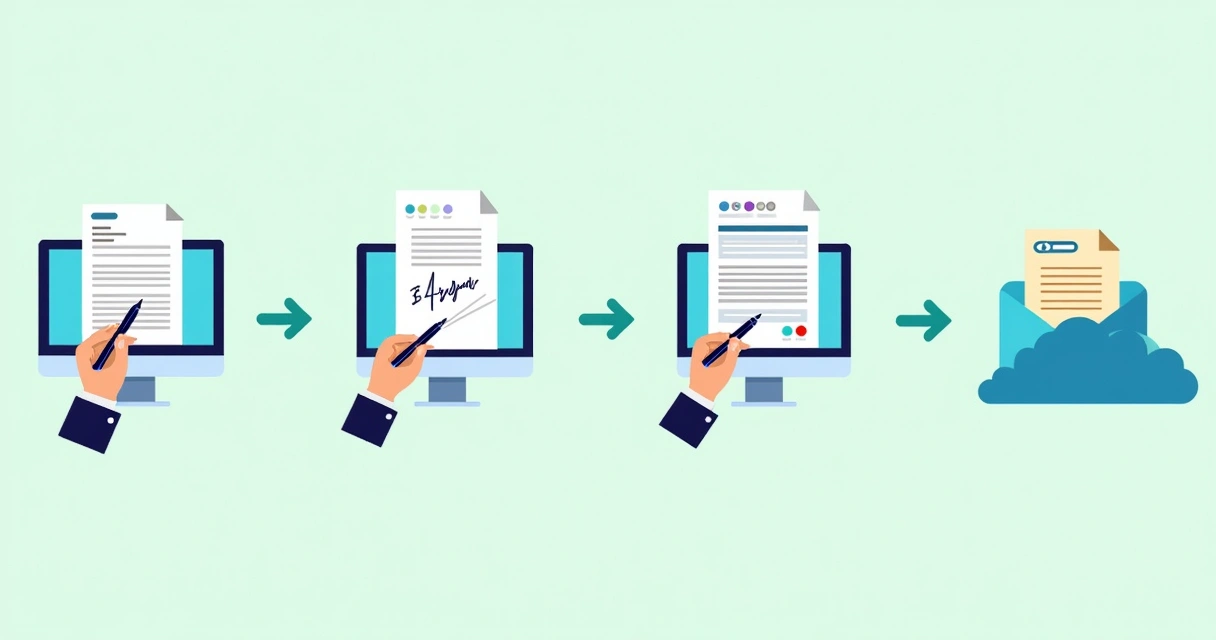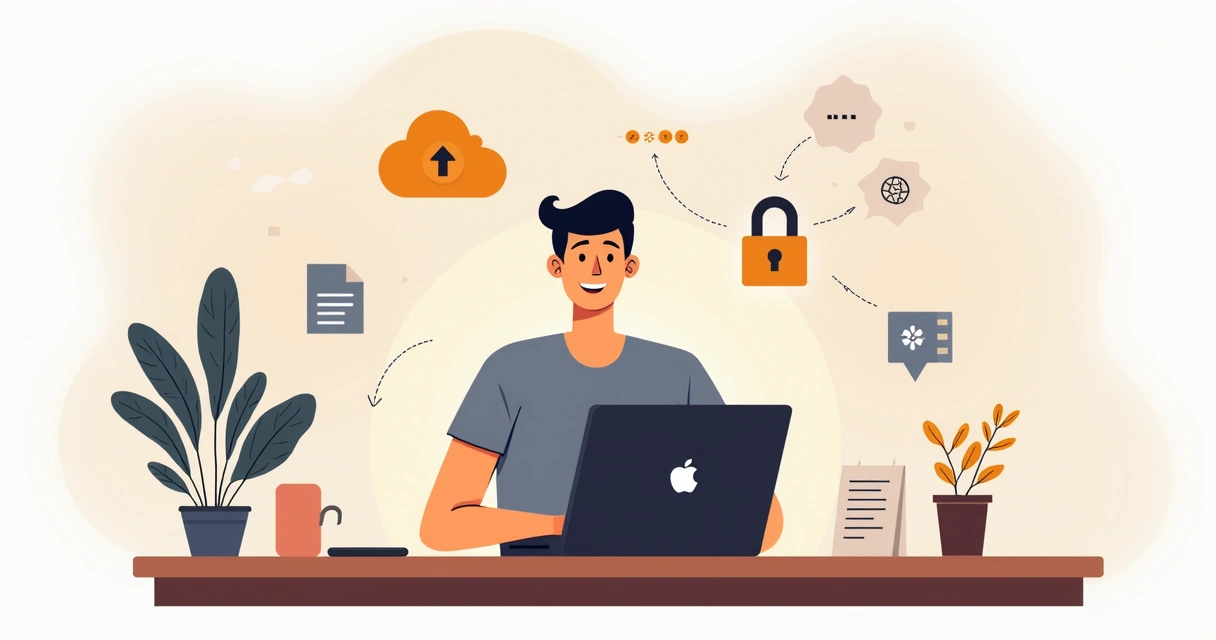Imagine this: you’re about to close a deal. The contract needs your signature. You’re in Galway, your client’s in Dublin. It’s late, and the last thing anyone wants is printing, signing, scanning, and emailing. There must be a better way…
There is. Electronic signatures are transforming how Irish businesses, freelancers, and even friends get documents signed. What if I told you it’s possible to sign contracts and agreements online, securely, and, for many, completely free?
This straightforward guide will show you exactly how to create and use a free e-signature in Ireland. Whether you’re running a small business, managing rental contracts, or handling daily HR paperwork, you’ll learn the practical steps, legal safeguards, pitfalls to avoid, and which platforms truly work (and which feel more like a locked door).
Why so many are moving to electronic signatures
Before we get into how, it’s worth pausing for a moment. Why are electronic signatures suddenly everywhere? Think of the last few years. Lockdowns, remote work, global teams… Paper just doesn’t fit modern workflows. E-signatures remove the need for face-to-face meetings just to scrawl your name. But it’s not only about convenience:
- Speed: Agreements close in hours, not days.
- Cost-savings: No more printing, postage, and storage fees.
- Audit trail: Every signature is timestamped and tracked, impossible with old-fashioned ink and paper.
- Environment: Less paper, less waste.
- Security: With the right platform, documents are safer than they ever were in a locked filing cabinet.
But there’s one word I keep hearing from Irish business owners: relief. No more chasing signatures by call or post. No more last-minute panics.

Still, questions remain: What’s really legal? Who can use these services? And can you truly sign a document online for free, without compromise?
Electronic signature versus digital signature: what really matters
People tend to use “electronic signature” and “digital signature” as if they’re the same. They’re not. Understanding the difference could save you headaches down the road.
- Electronic signature (e-signature): Any scanned or typed mark on a document intended as a signature. It can be as simple as typing your name in a box. It’s the most common type used in everyday business.
- Digital signature: A special kind of electronic signature that uses cryptography. It verifies your identity and locks the document, making changes very hard after signing.
For many contracts and everyday agreements, a good e-signature platform is enough. For high-stakes or official documents (think property sales or cross-border deals), a digital signature might give extra reassurance.
Legal experts in Ireland confirm that both can be legally recognised but advanced digital signatures carry more evidential weight.
Are e-signatures really legal in Ireland?
It’s a fair question. Is clicking “sign” online really binding? Irish law says yes, if you follow a few rules.
The Electronic Commerce Act 2000 and the EU’s eIDAS regulation both confirm: electronic signatures are recognised and enforceable throughout Ireland.
Here’s what matters in practice:
- Intention: Each party must intend to sign.
- Consent: There’s clear agreement about signing electronically.
- Integrity: The document can’t be tampered with once signed.
- Audit trail: The platform tracks who signed, when, and sometimes where.
For most business deals, leases, HR forms, and even NDAs, that’s enough. Some contracts, like wills or land transfers, may still require a “wet” (ink) signature, so double check your use case.
For a deep legal breakdown, you might find CloudSign.ie’s validity and legal facts of e-signatures in Ireland article useful.
Why small businesses and freelancers win big
Let me tell you about Fiona. She runs a busy architectural studio in Cork. Before e-signatures, contracts crawled from client to client, who sometimes forgot to sign or lost the scans. Now, everything is digital and safely tracked. No more “Did you sign that contract?” headaches.
For small businesses, the change is even more dramatic. Paperwork used to pile up, sometimes in shoeboxes. With e-signatures, documents are sorted, dated, and accessible with a few clicks. No extra admin staff required.
- Get paid faster: Invoices and agreements get signed (and paid) on the spot.
- Remote deals: New clients can join your business from anywhere in Ireland.
- Easy renewals: Memberships, subscriptions, and staff contracts update without a fuss.
- Better records: Everything is stored safely in the cloud, and finding anything takes seconds.
I spoke recently to Brian, a sole trader in Sligo. He said:
"I used to dread chasing signatures. Now, I send a link and know exactly when it’s done."
How to create a free e-signature in ireland: the step-by-step process
Ready to save time and get those documents signed? Here’s the quick and easy way, no special hardware, no tech skills required:
- Pick a reputable platform: Look for an Irish or EU-based provider. For individuals or small teams, CloudSign.ie offers a forever-free plan that lets you send up to 21 documents for signature every month.
- Upload your document: Drag and drop your PDF, Word, or other file into the platform. Most major tools handle all common formats.
- Place your signature field: Mark the spot where you (and others) should sign. Some software uses drag and drop, others just ask you to highlight the signature line.
- Create your signature: You can usually type, draw, or upload an image of your handwritten signature. CloudSign.ie uses advanced technology to ensure this is smooth for every user type.
- Send for signing: Enter your recipient’s email address. They get a secure link, no registration required on their end (a big plus for people who are not tech-savvy).
- Track and store: Once signed, you’re notified straight away. The signed document is stored safely in your dashboard, ready whenever you need it.
I’ve tested this with clients from small agencies, landlords, and even a sports club. The process always felt straightforward. No “fee surprises,” no locked features that stopped the flow.

Top electronic signature apps: features, plans, and honest limitations
With countless apps out there, not all are truly free. Some tempt you with “free” trials, but suddenly restrict vital features.
- CloudSign.ie: Stands out for its no-strings-attached free plan. One sender, up to 21 envelopes a month. No credit card required. Their audit trails, GDPR compliance, and AI-powered workflow (risk identification, reminders, etc.) make them exceptionally appealing for Irish businesses. Integrations with drive services, CRMs, and Slack are included even on entry tiers.
- Docusign: Globally popular, but their free tier is, for most, quite limited. After a handful of documents, monthly fees kick in. Docusign shines for multinationals, but for Irish freelancers, CloudSign.ie tends to feel more approachable and local.
- Adobe Acrobat Reader: Lets you add signatures to PDFs, but lacks advanced workflow, reminders, proper storage, and is less tailored to Irish or EU law. Good for very occasional needs, but frustrating as volume grows.
- Pandadoc and SignNow: Flexible, solid, but their pricing models and complexity aren’t a great match for beginners or small operations seeking no-fuss or free solutions.
When comparing, always watch out for:
- Hidden charges: Are automations, API access, or extra signatures actually free or quickly paywalled?
- Data storage: Is your data stored in the EU? For Irish companies, GDPR compliance isn’t optional.
- Reminders and tracking: Are you alerted when someone signs?
- Integrations: Can the tool link with your Google Drive, CRM, or Slack?
- Legal status: Is the platform truly eIDAS-compliant? This is non-negotiable for Irish legal protection.
CloudSign.ie checks all these boxes, and uniquely offers a full guide on free online signing and what to expect.
Advanced features: automation, integrations, and storage
Signing one document by hand is easy. Signing ten, every week, with reminders, deadlines, and storage, that’s different. Here’s where a good e-signature app makes all the difference:
- Workflow automation: Chasing signatures, sending reminders, and flagging unsigned docs can all happen without you lifting a finger. For busy HR managers and accountants, this is a lifesaver.
- API integrations: This lets your website, CRM, or custom app “talk” directly to your signature platform. For example, new customer contracts can be generated, sent, and tracked automatically when a deal closes. CloudSign.ie offers robust API access even for smaller businesses.
- Cloud storage: Documents are filed by date, client, or deal. Losing a signed contract is now almost impossible. Many platforms offer EU-hosted storage by default, vital for GDPR and eIDAS legal peace of mind.
For a deeper look into integration, CloudSign.ie’s simple guide to fast, secure digital signing is helpful.
If you use another platform, always check what their free tier includes. Often, integrations or even basic tracking get limited unless you pay.
CloudSign.ie remains generous compared to most, API, reminders, and cloud access do not disappear behind a paywall.
Security and compliance: what every user should know
A big signature on a screen is only half the story. What happens to it next? Irish law, under eIDAS and the Electronic Commerce Act 2000, demands platforms secure your data, prevent tampering, and can prove who signed what and when.
Some platforms offer a “certificate of completion”, a downloadable file showing the exact steps, timestamps, and device used for each signature. CloudSign.ie does this as standard, alongside automated GDPR compliance, regular transparency audits, and clear data protection processes.
"Trust only grows when people feel safe to sign."
I’ve met Irish firms worried about privacy, especially when personal data like PPS numbers travel digitally. With CloudSign.ie, and similarly cautious providers, you get EU cloud storage and airtight encryption. No guessing games.
The Law Society of Ireland highlights that advanced solutions give extra evidential value. Always confirm the platform is up to date with Irish and EU law, not just “sort of” safe.
Real user stories: speed, savings, and relief
Fiona’s story earlier isn’t rare. Here are a few more quick tales:
- Small law office in Limerick: Cut turnaround on client onboarding from four days to half a day. No lost paperwork, better client reviews.
- Retail manager in Dún Laoghaire: Bulk staff contracts signed in a weekend, just before opening a new shop. “I can’t believe I almost waited for the post,” he said.
- Construction contractor: Now collects insurance and safety declarations from every team, across five counties, without a single road trip.
Someone might say, “But what if my business is too small? What if I only send a contract now and then?” Free plans, like the one from CloudSign.ie, are ideal here. You only upgrade if and when you actually outgrow basic needs.

How to pick the right e-signature platform for your needs
Here’s a short checklist for anyone choosing their first e-signature solution or wondering if they should switch.
- Ease of use: If sending, signing, or tracking feels clumsy, skip it.
- Compliant storage: Data should never leave the EU unless you want it to.
- Free tier transparency: Look for clear limits, not “surprise” charges or hidden fees.
- Automation and reminders: Even small businesses benefit if the system does more than just “capture” a signature.
- Integration with your tools: Google Drive, Slack, major CRMs.
- Security guarantees: Encryption, audit trails, certificates of completion, and compliance with both GDPR and eIDAS are non-negotiable.
Some in Ireland swear by global brands. Others prefer local providers who “speak our language,” in every sense. Smartphones or tablets? Most Irish-friendly apps work perfectly across devices, which is game-changing for anyone on the road or working hybrid.
I suggest checking reviews, but nothing beats actually trying a service yourself. CloudSign.ie’s free plan, for example, doesn’t trap you into subscriptions or endless forms. You just sign up, upload a document, set the signature fields, and send.

What to avoid: common e-signature mistakes
I’ve made a few, and heard of plenty more:
- Not checking legal compliance: Some providers aren't up to date with Irish and EU law. Avoid this by sticking to platforms that highlight current Irish electronic signature laws.
- Over-sharing: Sending documents to the wrong email, not using authentication, or forgetting to limit who can view or sign.
- Ignoring notifications: Not noticing when recipients fail to sign or when system reminders aren't working.
- Sticking with paper for “trust”: The myth that paper is always safer is fading, but old habits sometimes linger.
Mistakes happen, but increasingly, Irish business owners are discovering that the process is surprisingly forgiving, and that a few clicks can take care of compliance and security for them.
Extra reading for the curious
If you want more technical details or a quick version for beginners, CloudSign.ie maintains a very practical beginner’s guide to electronic signatures that anyone can follow, plus an updated primer on Ireland’s electronic signature laws in 2024.
Conclusion: faster documents, finer control, and fewer headaches
E-signatures have changed the rhythm of business in Ireland. What once took days now takes minutes. For small businesses, compliance and storage used to feel like a fortress, now, anyone can manage contracts, close deals, and stay legal, all with a few taps.
Maybe you’re just starting as a freelancer. Maybe your team is doubling in size. No matter your needs, using a free electronic signature in Ireland is not just possible, it’s fast, legal, and a genuine time-saver.
CloudSign.ie was built to take the hassle out of online signing, making it safe, secure, and available to every individual and company that wants to finally move past paper. Ready to see for yourself? Take a closer look at what CloudSign.ie offers and see how easy it is to sign smarter today.
Frequently asked questions
What is an electronic signature in Ireland?
An electronic signature (or e-signature) in Ireland means any data (like your name, a scan, or typed signature) attached to a digital document to show agreement or intent to sign. They are recognized by law when used appropriately, provided there's an intention to sign and the document’s integrity is maintained. The Electronic Commerce Act 2000 and eIDAS regulation make these signatures valid for most business, HR, and personal uses.
How do I create a free e-signature?
To create a free e-signature, choose a platform like CloudSign.ie, which has a forever-free plan for individuals. Upload your document, PDF or otherwise, use the tools to type, draw, or upload your signature, and send it for signing. The recipient doesn’t need to create an account in many cases. For step-by-step help, CloudSign.ie’s own free guide is very practical.
Are free e-signatures legally valid in Ireland?
Yes, provided you use a reputable, compliant provider. Free e-signatures are legally valid under Irish and EU law as long as the platform follows eIDAS and Electronic Commerce Act standards, intention to sign, integrity of document, and clear consent are the key pillars. Always check your use case, some contracts (like property deeds or wills) may require “wet” signatures but most business docs are covered. eSign and other established platforms confirm the legal standing.
Where can I get the best free e-signature tool?
The best option depends on your needs, but CloudSign.ie is ideal for anyone seeking a forever-free Irish solution with no hidden costs, strong legal backing, and practical integrations. It’s easier to set up than most global alternatives, especially for those who value GDPR compliance and real customer support. The simple guide by CloudSign.ie lays out the process and benefits.
Is it safe to use free e-signature services?
Yes, but only if you stick to trusted, law-compliant providers. Safety comes from strong encryption, secure cloud storage, certificates of completion, and GDPR/eIDAS adherence. Free doesn’t mean “insecure” if the company is transparent about their processes. The Law Society of Ireland states that advanced, certified solutions bring greater evidential strength, another reason to pick a reputable service like CloudSign.ie rather than a generic tool from abroad.
